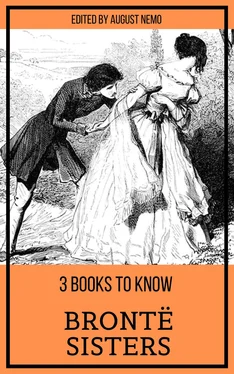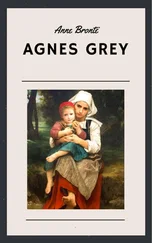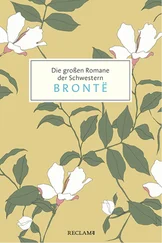‘No, I think not,’ observed Rose; ‘for she didn’t seem very disconsolate after all; and she’s excessively pretty—handsome rather—you must see her, Gilbert; you will call her a perfect beauty, though you could hardly pretend to discover a resemblance between her and Eliza Millward.’
‘Well, I can imagine many faces more beautiful than Eliza’s, though not more charming. I allow she has small claims to perfection; but then, I maintain that, if she were more perfect, she would be less interesting.’
‘And so you prefer her faults to other people’s perfections?’
‘Just so—saving my mother’s presence.’
‘Oh, my dear Gilbert, what nonsense you talk!—I know you don’t mean it; it’s quite out of the question,’ said my mother, getting up, and bustling out of the room, under pretence of household business, in order to escape the contradiction that was trembling on my tongue.
After that Rose favoured me with further particulars respecting Mrs. Graham. Her appearance, manners, and dress, and the very furniture of the room she inhabited, were all set before me, with rather more clearness and precision than I cared to see them; but, as I was not a very attentive listener, I could not repeat the description if I would.
The next day was Saturday; and, on Sunday, everybody wondered whether or not the fair unknown would profit by the vicar’s remonstrance, and come to church. I confess I looked with some interest myself towards the old family pew, appertaining to Wildfell Hall, where the faded crimson cushions and lining had been unpressed and unrenewed so many years, and the grim escutcheons, with their lugubrious borders of rusty black cloth, frowned so sternly from the wall above.
And there I beheld a tall, lady-like figure, clad in black. Her face was towards me, and there was something in it which, once seen, invited me to look again. Her hair was raven black, and disposed in long glossy ringlets, a style of coiffure rather unusual in those days, but always graceful and becoming; her complexion was clear and pale; her eyes I could not see, for, being bent upon her prayer-book, they were concealed by their drooping lids and long black lashes, but the brows above were expressive and well defined; the forehead was lofty and intellectual, the nose, a perfect aquiline and the features, in general, unexceptionable—only there was a slight hollowness about the cheeks and eyes, and the lips, though finely formed, were a little too thin, a little too firmly compressed, and had something about them that betokened, I thought, no very soft or amiable temper; and I said in my heart—‘I would rather admire you from this distance, fair lady, than be the partner of your home.’
Just then she happened to raise her eyes, and they met mine; I did not choose to withdraw my gaze, and she turned again to her book, but with a momentary, indefinable expression of quiet scorn, that was inexpressibly provoking to me.
‘She thinks me an impudent puppy,’ thought I. ‘Humph!—she shall change her mind before long, if I think it worth while.’
But then it flashed upon me that these were very improper thoughts for a place of worship, and that my behaviour, on the present occasion, was anything but what it ought to be. Previous, however, to directing my mind to the service, I glanced round the church to see if any one had been observing me;—but no,—all, who were not attending to their prayer-books, were attending to the strange lady,—my good mother and sister among the rest, and Mrs. Wilson and her daughter; and even Eliza Millward was slily glancing from the corners of her eyes towards the object of general attraction. Then she glanced at me, simpered a little, and blushed, modestly looked at her prayer-book, and endeavoured to compose her features.
Here I was transgressing again; and this time I was made sensible of it by a sudden dig in the ribs, from the elbow of my pert brother. For the present, I could only resent the insult by pressing my foot upon his toes, deferring further vengeance till we got out of church.
Now, Halford, before I close this letter, I’ll tell you who Eliza Millward was: she was the vicar’s younger daughter, and a very engaging little creature, for whom I felt no small degree of partiality;—and she knew it, though I had never come to any direct explanation, and had no definite intention of so doing, for my mother, who maintained there was no one good enough for me within twenty miles round, could not bear the thoughts of my marrying that insignificant little thing, who, in addition to her numerous other disqualifications, had not twenty pounds to call her own. Eliza’s figure was at once slight and plump, her face small, and nearly as round as my sister’s,—complexion, something similar to hers, but more delicate and less decidedly blooming,—nose, retroussé,—features, generally irregular; and, altogether, she was rather charming than pretty. But her eyes—I must not forget those remarkable features, for therein her chief attraction lay—in outward aspect at least;—they were long and narrow in shape, the irids black, or very dark brown, the expression various, and ever changing, but always either preternaturally—I had almost said diabolically—wicked, or irresistibly bewitching—often both. Her voice was gentle and childish, her tread light and soft as that of a cat:—but her manners more frequently resembled those of a pretty playful kitten, that is now pert and roguish, now timid and demure, according to its own sweet will.
Her sister, Mary, was several years older, several inches taller, and of a larger, coarser build—a plain, quiet, sensible girl, who had patiently nursed their mother, through her last long, tedious illness, and been the housekeeper, and family drudge, from thence to the present time. She was trusted and valued by her father, loved and courted by all dogs, cats, children, and poor people, and slighted and neglected by everybody else.
The Reverend Michael Millward himself was a tall, ponderous elderly gentleman, who placed a shovel hat above his large, square, massive-featured face, carried a stout walking-stick in his hand, and incased his still powerful limbs in knee-breeches and gaiters,—or black silk stockings on state occasions. He was a man of fixed principles, strong prejudices, and regular habits, intolerant of dissent in any shape, acting under a firm conviction that his opinions were always right, and whoever differed from them must be either most deplorably ignorant, or wilfully blind.
In childhood, I had always been accustomed to regard him with a feeling of reverential awe—but lately, even now, surmounted, for, though he had a fatherly kindness for the well-behaved, he was a strict disciplinarian, and had often sternly reproved our juvenile failings and peccadilloes; and moreover, in those days, whenever he called upon our parents, we had to stand up before him, and say our catechism, or repeat, ‘How doth the little busy bee,’ or some other hymn, or—worse than all—be questioned about his last text, and the heads of the discourse, which we never could remember. Sometimes, the worthy gentleman would reprove my mother for being over-indulgent to her sons, with a reference to old Eli, or David and Absalom, which was particularly galling to her feelings; and, very highly as she respected him, and all his sayings, I once heard her exclaim, ‘I wish to goodness he had a son himself! He wouldn’t be so ready with his advice to other people then;—he’d see what it is to have a couple of boys to keep in order.’
He had a laudable care for his own bodily health—kept very early hours, regularly took a walk before breakfast, was vastly particular about warm and dry clothing, had never been known to preach a sermon without previously swallowing a raw egg—albeit he was gifted with good lungs and a powerful voice,—and was, generally, extremely particular about what he ate and drank, though by no means abstemious, and having a mode of dietary peculiar to himself,—being a great despiser of tea and such slops, and a patron of malt liquors, bacon and eggs, ham, hung beef, and other strong meats, which agreed well enough with his digestive organs, and therefore were maintained by him to be good and wholesome for everybody, and confidently recommended to the most delicate convalescents or dyspeptics, who, if they failed to derive the promised benefit from his prescriptions, were told it was because they had not persevered, and if they complained of inconvenient results therefrom, were assured it was all fancy.
Читать дальше











